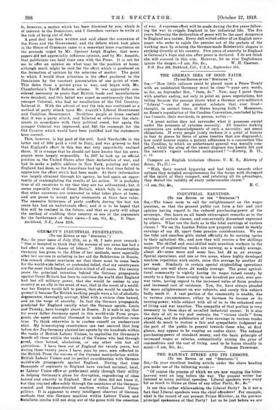INDUSTRIAL EARNINGS.
[To Tim EDITOR Or THE " SPECTATOR."3 Sta,—The times seem to call for enlightenment on the wages question, so that the general public can form a fair and just opinion having regard to the reduced purchasing-power of the sovereign. One hears on all hands extravagant remarks as to the earnings of certain classes, and concurrently discontent expressed by others. What are the facts as to the total earnings of various classes ? We see the London Police now properly raised to weekly earnings of say £3, apart from pension considerations. We see the tube and omnibus girls stated officially to be earning (prior to their agitation) 63s., and now they will receive a few shillings more. The skilled and semi-skilled male munition workers in the majority of engineering works are earning, as a weekly average, about £4—some more and some less, but £4 as an average. Special operations, and one or two areas, where highly developed machine repetition work exists, raise this average by another £1 per week. Similarly in certain special shipbuilding operations earnings are well above £4 weekly average. The great agricul- tural community is Tightly having its wages raised county by county to a figure from seventy to one hundred per cent, over pre- war rates, having regard to the increased value of farm produce and increased cost of existence. You, Sir, have always pleaded for more enlightenment on war subjects, and surely this subject badly needs it. A vast portion of the community is unable, due to various circumstances, either to increase its income or its earning-power, while subject with all of us to the enhanced cost of living and war taxation. The sympathy of that portion is very necessary in these days of so-called industrial unrest. It is also the duty of all to try and restrain the "vicious circle" from expanding, and the publication of true earnings in various trades should do much to restore a fair and sympathetic judgment on the part of the public in general towards those who, at first glance, may appear to be reaping an undue share. The reduced purchasing-power of standard money, and the basic principle of increased wages or salaries, automatically raising the price of commodities and the cost of living, need to be borne steadily in


































 Previous page
Previous page